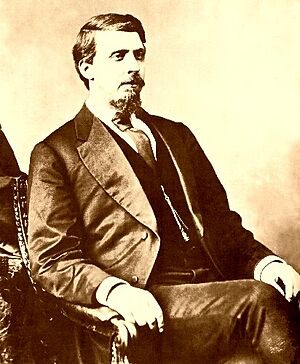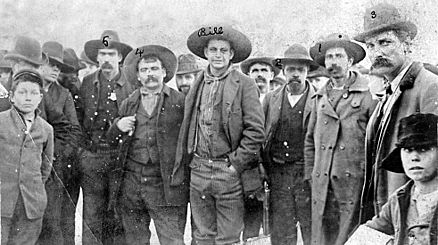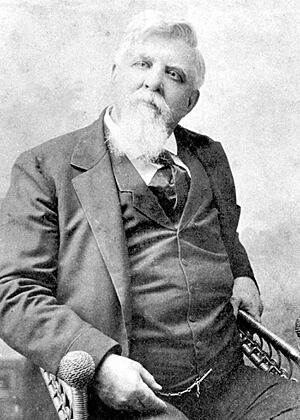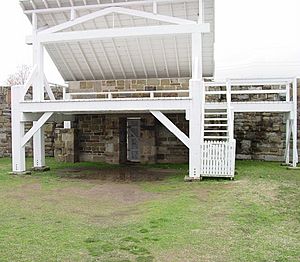Isaac Charles Parker facts for kids
Quick facts for kids
Isaac Charles Parker
|
|
|---|---|
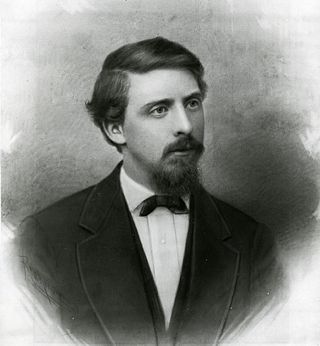
Portrait of Isaac C. Parker, Fort Smith National Historic Site
|
|
| Judge of the United States District Court for the Western District of Arkansas | |
| In office March 19, 1875 – November 17, 1896 |
|
| Appointed by | Ulysses S. Grant |
| Preceded by | William Story |
| Succeeded by | John Henry Rogers |
| Member of the U.S. House of Representatives from Missouri |
|
| In office March 4, 1871 – March 3, 1875 |
|
| Preceded by | Joel Funk Asper |
| Succeeded by | David Rea |
| Constituency | 7th district (1871–73) 9th district (1873–75) |
| Personal details | |
| Born |
Isaac Charles Parker
October 15, 1838 Barnesville, Ohio |
| Died | November 17, 1896 (aged 58) Fort Smith, Arkansas |
| Resting place | Fort Smith National Cemetery Fort Smith, Arkansas |
| Political party | Democratic (until 1864) Republican (from 1864) |
| Education | read law |
Isaac Charles Parker (born October 15, 1838 – died November 17, 1896) was an American politician and judge. He is often called “Hanging Judge” Parker. He served as a United States representative for Missouri. Later, he became the first federal judge for the United States District Court for the Western District of Arkansas. This court also had power over the Indian Territory, which is now Oklahoma.
Judge Parker became famous in the American Old West because he sentenced many people found guilty of serious crimes. During his 21 years as a federal judge, he handled 13,490 cases. In over 8,500 of these cases, the person either admitted guilt or was found guilty by a jury. Parker sentenced 160 people to death, and 79 of those sentences were carried out. The others either died in prison, were pardoned, or had their sentences changed.
Contents
Early Life and Education
Isaac Parker was born in Barnesville, Ohio, on October 15, 1838. He was the youngest son of Joseph and Jane Shannon Parker. His great-uncle, Wilson Shannon, was a governor of Ohio. Isaac grew up on his family's farm.
He went to Breeze Hill Primary School and then the Barnesville Classical Institute, a private school. To pay for his education, he taught at a local primary school. At 17, he started learning law by working with an experienced law firm. This was called "reading the law." He passed the Ohio bar exam in 1859 when he was 21.
Around 1859, Parker moved to St. Joseph, Missouri. He joined his uncle's law firm there. On December 12, 1861, he married Mary O'Toole. They had two sons, Charles and James. By 1862, Parker had his own law firm. He worked on cases in both city and county courts.
Political Career
In April 1861, Parker became the city attorney for St. Joseph as a Democrat. He served three one-year terms. When the American Civil War began, he joined a local pro-Union group called the 61st Missouri Emergency Regiment. He reached the rank of corporal by the end of the war.
During the 1860s, Parker continued his work in law and politics. In 1864, he left the Democratic Party because of different views on slavery. He then joined the Republican Party. He ran for county prosecutor and also served in the Electoral College, voting for Abraham Lincoln's re-election. In 1868, Parker was elected as a judge for the Twelfth Missouri Circuit Court for a six-year term.
In 1870, Parker was chosen to run for the United States House of Representatives for Missouri's 7th district. He resigned from his judgeship to focus on his campaign. Parker won the election and served in the House of Representatives from March 4, 1871, to March 3, 1875.
During his time in Congress, Parker worked to help veterans in his district. He also supported a bill that would have allowed women to vote and hold public office in U.S. territories. He also worked on laws to organize the Indian Territory under a government.
In his second term, Parker focused on policies for Native American tribes in the Indian Territory. He gave speeches supporting the Bureau of Indian Affairs, which gained national attention. In 1874, he was considered for a Senate seat, but he decided to seek a presidential appointment as a judge instead.
Federal Judge in Arkansas
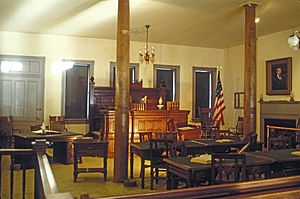
On March 18, 1875, President Ulysses S. Grant nominated Isaac Parker to be a judge for the United States District Court for the Western District of Arkansas. The United States Senate approved his appointment the next day. He started his new role on March 19, 1875, and served until his death in 1896.
Parker arrived in Fort Smith on May 4, 1875. His first court session as judge was on May 10, 1875. On that same day, Parker appointed Bass Reeves as a Deputy US Marshal. Reeves became one of the first African American lawmen in the American West.
In his first court session in May 1875, Parker heard cases for 18 men accused of murder. Fifteen of them were found guilty. Parker sentenced eight of them to death, as the law required. Six of these men were set to be executed at the same time. Parker later said in an interview that he had no choice in these death sentences because the law made them mandatory. He also stated that he actually favored ending capital punishment.
From 1875 to 1889, Parker's court was the final court for federal crimes in the Indian Territory. This was because there was no higher court for appeals there. Native American tribes had their own legal systems for their citizens. Federal law in Indian Territory applied to non-Native American U.S. citizens.
Parker's court was very busy. It was supposed to meet four times a year, but the cases piled up so much that the terms often ran together. The court met six days a week, sometimes for ten hours a day, to handle all the cases. In 1883, Congress reduced the court's area of power, but more settlers moving into the Indian Territories still kept the court very busy.
After May 1, 1889, people sentenced to death could appeal their cases to the United States Supreme Court. Out of 44 death penalty cases from Parker's court that went to the Supreme Court, 30 were sent back for a new trial.
While serving as a judge, Parker also helped his community in Fort Smith. He was on the Fort Smith School Board and was the first president of St. John's Hospital.
(right): depiction of the hanging, as it was published by newspapers after his execution
Parker oversaw many important cases. One famous case involved Crawford Goldsby, also known as "Cherokee Bill." In 1895, Goldsby was accused of killing someone during a robbery. Parker sentenced him to death. While waiting for his execution, Goldsby tried to escape and killed a prison guard. He was tried again in Parker's court, found guilty, and sentenced to death again. He was executed on March 17, 1896.
Later Years and Court Changes
As more people moved West, a new federal court system was created in the Indian Territory in 1889. This reduced the area that Parker's court in Fort Smith covered.
Parker sometimes disagreed with the Supreme Court. About two-thirds of his court's decisions that were appealed to the Supreme Court were upheld. In 1894, Parker had a notable disagreement with the Supreme Court over a case involving Lafayette Hudson. Hudson was found guilty of assault and sentenced to prison. The Supreme Court granted him bail, but Parker refused to release him. Parker believed the Supreme Court did not have the power to demand Hudson's release.
In 1895, Congress passed a law that removed the remaining Indian Territory cases from Parker's court, starting September 1, 1896.
Death and Legacy
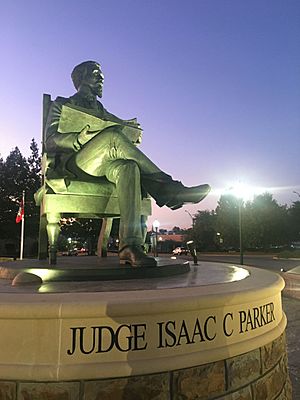
By August 1896, Parker was very ill with Bright's disease and could not preside over court. The court's power over Indian Territory ended on September 1, 1896. Reporters wanted to interview Parker about his career, but he was too sick. He died on November 17, 1896, from heart problems and Bright's disease. His funeral in Fort Smith was the largest the city had seen. He is buried at the Fort Smith National Cemetery.
In 2019, the city of Fort Smith honored Parker by unveiling a statue of him. The statue represents law and order.
In Popular Culture
- Charles Portis included Parker in his novel True Grit. This book was made into movies twice. Parker was played by James Westerfield in the 1969 movie and by Jake Walker in the 2010 remake.
- Zeke Proctor, one of Parker's deputy marshals, is in Larry McMurtry's 1997 novel Zeke and Ned.
- In the 1968 film Hang 'Em High, the character Adam Fenton is loosely based on Judge Parker.
- The Steve Earle song "Tom Ames' Prayer" mentions the narrator being sentenced to death by Parker.
See also
 In Spanish: Isaac Parker para niños
In Spanish: Isaac Parker para niños
- George Maledon, a hangman who worked for Judge Isaac Parker's court.
- Shannon Political Family


